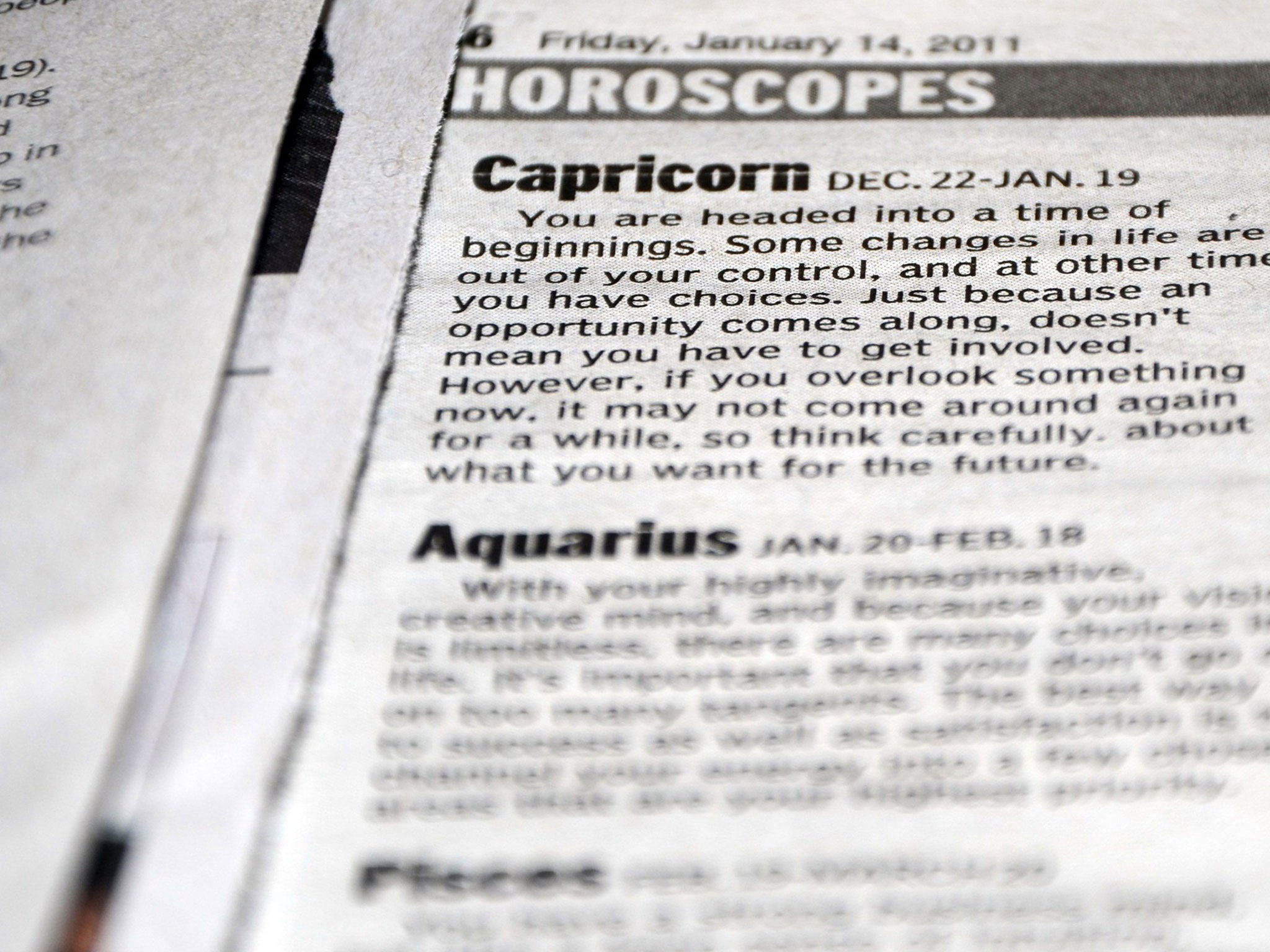The Independent's journalism is supported by our readers. When you purchase through links on our site, we may earn commission.
Psy-Q by Ben Ambridge: Horoscopes extract looks into science behind the star signs

Ben Ambridge, a senior lecturer in psychology at the University of Liverpool, recently set out to explore the Psy-Q in his new book, by attempting to look into how much we, as humans, know and understand about what makes us tick.
We've put together a short quiz based on one of the tests in Psy-Q along with an extract from the book where he explains whether there's really any truth behind horoscopes.
Just click to say whether you think the following statements are 'True' or 'False' and let us know how you get on.
All of these statements are true.
Does this mean that we should believe everything that’s written in our horoscope? Of course not; horoscopes are clearly a load of nonsense. So how can it be that all of the statements are true?
The answer is that your star sign is determined by the month of your birth, which has important effects on both your physical and psychological development.
In terms of height, babies born in April get the most sunlight at what seems to be a particularly crucial point in their physical development, three months after their birth (July); babies born in October, the least (January). Nobody is quite sure why winter-born babies have a (very slightly) elevated risk of developing schizophrenia (with the peak in February–March), although it may again be related to a lack of sunlight (and therefore vitamin D) at a particularly crucial stage in development. Similarly, there are a number of different explanations of why autumn-born babies are more likely to live to a hundred than winter-borns. It may be to do with avoiding particularly high or low temperatures at the point of birth or conception, or that it is best to avoid being a young and vulnerable infant at the peak season for particular diseases (whose effects can last into adulthood and old age).
Differences in performance at school – in both sports and the more academic subjects – have a different type of explanation. In the UK (where these studies were conducted), the cut-off date for starting school is September. So Librans and Scorpios (and some Virgos) will always be the oldest children in a given year group, Cancers and Leos (and the unluckier Virgos) the youngest. Since the oldest children are almost a full year older than the youngest in the same year group, this gives them a huge advantage in both sports (where they will be bigger and stronger) and academic subjects: young children develop so quickly that, for example, a five-year-old is much more intellectually advanced than a four-year-old.
In Sweden the school starting cut-off is January. This means that although a girl who is born in, say December 1992 is slightly older than a girl born in January 1993, in terms of her year group she is the youngest and consequently ‘acts younger’ (i.e., she’s more likely to do reckless things, including getting pregnant).
So could there actually be something in horoscopes? Perhaps, for example, Aries are perceived as aggressive because they tend to be tall? In a word, ‘no’. Remember that, in all of these cases, what matters is the season of the birth, not the month. So in the southern hemisphere, where spring starts in September, it will be Libras, Scorpios and Sagittarians who are tall, rather than Aries, Taureans and Librans.
Why, then, do so many people swear by the truth-telling power of a horoscope? Confirmation bias means that, if you throw out enough general statements, some will stick. If you have a friend who believes in horoscopes, try reading the following passage, telling your victim that it is specific to his or her sign:
"You have a need for other people to like and admire you, and yet you tend to be critical of yourself. While you have some personality weaknesses, you are generally able to compensate for them. You have considerable unused capacity that you have not turned to your advantage. Disciplined and self-controlled on the outside, you tend to be worrisome and insecure on the inside. At times you have serious doubts as to whether you have made the right decision or done the right thing.
"You prefer a certain amount of change and variety and become dissatisfied when hemmed in by restrictions and limitations. You also pride yourself as an independent thinker, and do not accept others’ statements without satisfactory proof. But you have found it unwise to be too frank in revealing yourself to others. At times you are extroverted, affable and sociable, while at other times you are introverted, wary, and reserved. Some of your aspirations tend to be rather unrealistic."
Did they fall for it? This is a standard text that has been doing the rounds since 1949, and that people rate as – on average – 85 per cent accurate, regardless of star sign. So while season-of-birth effects are real, horoscopes are – as far as scientific validity is concerned– a horror show.
Psy-Q by Ben Ambridge is available now
Join our commenting forum
Join thought-provoking conversations, follow other Independent readers and see their replies
Comments
Bookmark popover
Removed from bookmarks